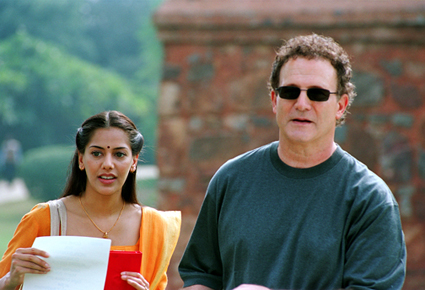|
Reviews of Recent Independent, Foreign, & Documentary Films in Theaters and DVD/Home Video
Directed & Written by: Albert Brooks. Produced by: Herb Nanas. Director of Photography: Thomas Ackerman. Edited by: Anita Brandt Burgoyne. Music by: Michael Giacchino. Released by: Warner Independent. Country of Origin: USA. 98 min. Rated: PG-13. With: Albert Brooks, John Carroll Lynch, Sheetal Sheth, Jon Tenney & Fred Dalton Thompson.
Director Albert Brooks receives a letter from the government requesting him to travel to the Middle East to discover what makes people laugh there. Dazzled by the prospect of a winning a Medal of Freedom, Brooks, with his wife’s encouragement, heads to New Delhi with two government-appointed assistants, the obsequious Mark (Jon Tenney) and ladies man Stuart (John Carroll Lynch). The fact the director plays himself, as the “buffoon” (as he calls himself), gives the film an overall documentary feel, complimented by the rather unstructured plot.
Beautiful Sheetal Sheth plays Maya, Brooks’ personal secretary in New Delhi. She asks Brooks if he would mind if she announced she was romantically linked to him, just so her jealous Iranian boyfriend would leave her alone. Such subplots are somewhat superfluous and unrealistic, almost like extra inserts to create a more “movie-like” film. But Looking for Comedy nevertheless falls short of doing that, namely because, as Stuart mentions in reference to Brooks’ Lost in America, the ending feels very “tacked-on.” Looking for Comedy runs smoothly throughout its 98 minute running time, but then suddenly just…ends.
Set largely in Hindu-dominated India and not the Middle East, the film would have been more accurately entitled Looking for Comedy in India and on the Border of Pakistan (though much more cumbersome). Still, the film's concept is appealing, although Brooks never really discovers comedy in the Muslim world. Instead, he finds what does not make Muslims laugh, which, perhaps, is all he can do, thus sending up the mockumentary’s intent (which is an impossibility anyway; all Muslims can't fit into one category). And the ironic and droll humor would probably appeal to an older crowd, who might relate more to the shtick dealing with new, perplexing technology than a younger audience.
In a strange and witty plot twist, Brooks is kicked out of India (he never even legally makes it to Pakistan). The Indian government’s suspicion of Brooks and his subsequent exile very subtly points to the tragic fact that despite civilians’ attempts or intentions to form amicable bonds with other cultures, politics always somehow gets in the way.
Parisa Vaziri
|
